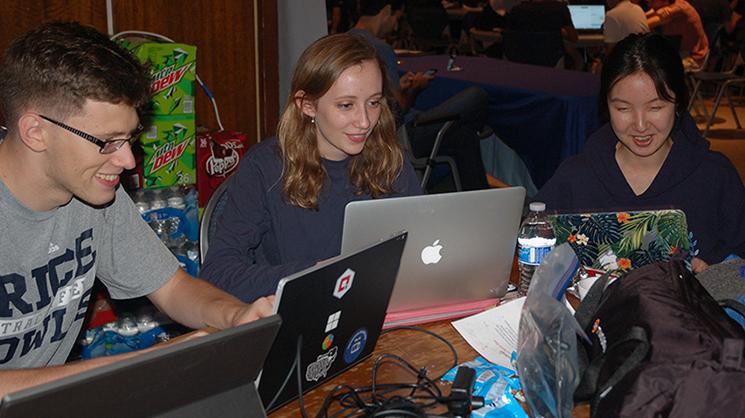HackRice 7, the seventh annual 48-hour event hosted by Rice University's Computer Science Club, attracted over 450 participants and almost $50,000 in donations. The event was designed to create an environment in which students can create new applications and prototypes, then present their projects to compete for prizes,
The winning team, composed of students from four universities, also included the student who probably traveled the greatest distance to participate. Holly Buteau, a Computer Science senior at Oregon State, flew over 2300 miles to Houston, outdistancing participants who arrived from schools like Harvard, Yale, Stanford, and Duke.
Buteau joined a team of fellow NASA interns from Texas A&M University and the University of Texas at El Paso. The trio also brought in a mechanical engineering graduate student at the University of Houston to create STIC, a smart walking cane that provides assistive technology for legally blind people.
Their prototype as well as the second place winner, Cruze Control, were typical of the projects that came out of the new Medical Track in this year's hackathon. The Cruze Control team wanted to improve safety for longboarders and created a display indicating the rider's speed and revolutions per minute, with a rear lighting system that alerts others in traffic when the rider is speeding up or slowing down. The third place winner also worked on an app for visually-impaired people, modifying computer vision to read text and interpret images.
Regardless of the success of their coding, participants could learn new technologies and platforms through optional one-hour workshops. These quick dives covered the basics of topics like machine learning, IBM Watson, cloud platforms, deep learning, analyzing flight data, and even how to give good technical presentations.
The 2017 sponsors donated food, beverages, raffle prizes in addition to designated development awards of $11,000. The 24 development awards required several heats to evaluate the 58 submitted team projects and narrow down the list of winners. The top five teams presented their projects for the final round of judging prior to the closing ceremonies.
For more details about HackRIce 7, see the following articles:
Rice University's Hackathon works to solve health
Students compete in hackathon
Alumni and Community Support grow with HackRice
STIC - Inside the Healthcare App that Won HackRice 7

